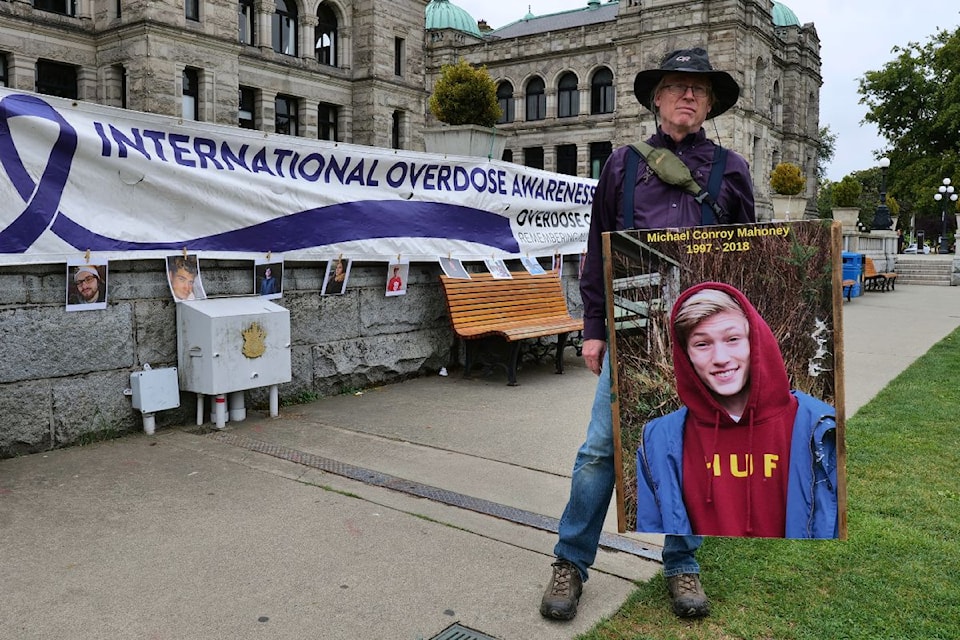Top Stories
Father Demands Action on Drug Crisis After Son’s Tragic Death

At the B.C. legislature, Glenn Mahoney shared his painful story during Overdose Prevention Day, highlighting a growing crisis in British Columbia. His son, Michael, developed a substance use disorder at the age of 13 after being prescribed oxycodone for a medical issue. Tragically, Michael’s life ended at 21 when he died alone in his car, a victim of toxic drug use. This heartbreaking narrative reflects a larger crisis, as over 17,000 people in British Columbia have died from similar causes since the public health emergency was declared in April 2016.
Mahoney expressed his disbelief at the ongoing inaction surrounding this issue. “Death. Too much preventable death,” he stated, emphasizing the shocking reality that 2,000 more people have died since last year’s gathering. His frustration was palpable as he questioned why society is not more outraged by these statistics.
During the event, attendees who had lost loved ones to the crisis lay on the steps of the legislature, a powerful visual protest that drew attention to the severity of the situation. Signs reading “They were so loved” accompanied photographs of those lost, including many young teens.
According to Lisa Lapointe, former chief coroner of British Columbia, drug toxicity remains the leading cause of death for individuals aged 19 to 59 in the province. She challenged the crowd by asking, “What could be more important?” Lapointe advocated for standardized, evidence-based, and free treatment options, questioning why the government has not integrated these into the healthcare system.
The Mahoney family, both of whom hold advanced degrees, struggled to navigate the existing healthcare system to find support for Michael. They resorted to “very expensive” private treatment programs that were abstinence-based and stigmatized those using prescribed psychiatric medications. Mahoney described the experience as one where “at every step, you’re punished and stigmatized.”
Michael had found some stability while on pharmaceutical alternatives, also referred to as safe supply. Unfortunately, after losing access to these alternatives, he turned to street drugs, which ultimately led to his death. His case was referenced by the coroners’ death review panel in 2020, highlighting the numerous encounters the family had with the healthcare system, including being denied applications from Island Health and not being accepted as patients by adult community psychiatrists.
“At every point and every encounter, the system made his condition worse,” Mahoney asserted. He criticized the public policy failures that contributed to his son’s struggles.
Lapointe and Kelsey Roden, an addiction medicine specialist and co-founder of Doctors for Safer Drug Policy, pointed out that while there has been progress with overdose prevention sites, decriminalization, and safe supply, the high rates of death persist due to ongoing prohibition and stigma. Lapointe suggested there are “straightforward things” that could be done to prevent these deaths, including acknowledging the crisis as a health issue.
She raised concerns about private residential treatment centers charging “tens of thousands of dollars” for unstandardized care and advocated for the need for pharmaceutical alternatives. “They are a really, really important way of stabilizing people so they can start to see a future,” she said, emphasizing the importance of moving individuals away from the chaotic drug trade.
For Glenn and Jan Mahoney, their fight is far from over. They remain committed to advocating for change so that no other family has to endure the loss they experienced. They remember Michael as a “creative, artistic, funny, caring, and polite” young man who once sang with Victoria Opera. “If I have to be here every year until I’m 100, I’m gonna be here to tell the government that this is not good enough. These lives matter,” Jan Mahoney stated firmly.
As the opioid crisis continues to claim lives, the call for comprehensive, accessible treatment and a shift in public perception has never been more urgent. The Mahoneys’ commitment to raising awareness serves as a poignant reminder of the human cost of inaction.
-

 Science2 months ago
Science2 months agoToyoake City Proposes Daily Two-Hour Smartphone Use Limit
-

 Health2 months ago
Health2 months agoB.C. Review Reveals Urgent Need for Rare-Disease Drug Reforms
-

 Top Stories2 months ago
Top Stories2 months agoPedestrian Fatally Injured in Esquimalt Collision on August 14
-

 Technology2 months ago
Technology2 months agoDark Adventure Game “Bye Sweet Carole” Set for October Release
-

 World2 months ago
World2 months agoJimmy Lai’s Defense Challenges Charges Under National Security Law
-

 Technology2 months ago
Technology2 months agoKonami Revives Iconic Metal Gear Solid Delta Ahead of Release
-

 Technology2 months ago
Technology2 months agoSnapmaker U1 Color 3D Printer Redefines Speed and Sustainability
-

 Technology2 months ago
Technology2 months agoAION Folding Knife: Redefining EDC Design with Premium Materials
-

 Business2 months ago
Business2 months agoGordon Murray Automotive Unveils S1 LM and Le Mans GTR at Monterey
-

 Technology2 months ago
Technology2 months agoSolve Today’s Wordle Challenge: Hints and Answer for August 19
-

 Lifestyle2 months ago
Lifestyle2 months agoVictoria’s Pop-Up Shop Shines Light on B.C.’s Wolf Cull
-

 Technology2 months ago
Technology2 months agoApple Expands Self-Service Repair Program to Canada









